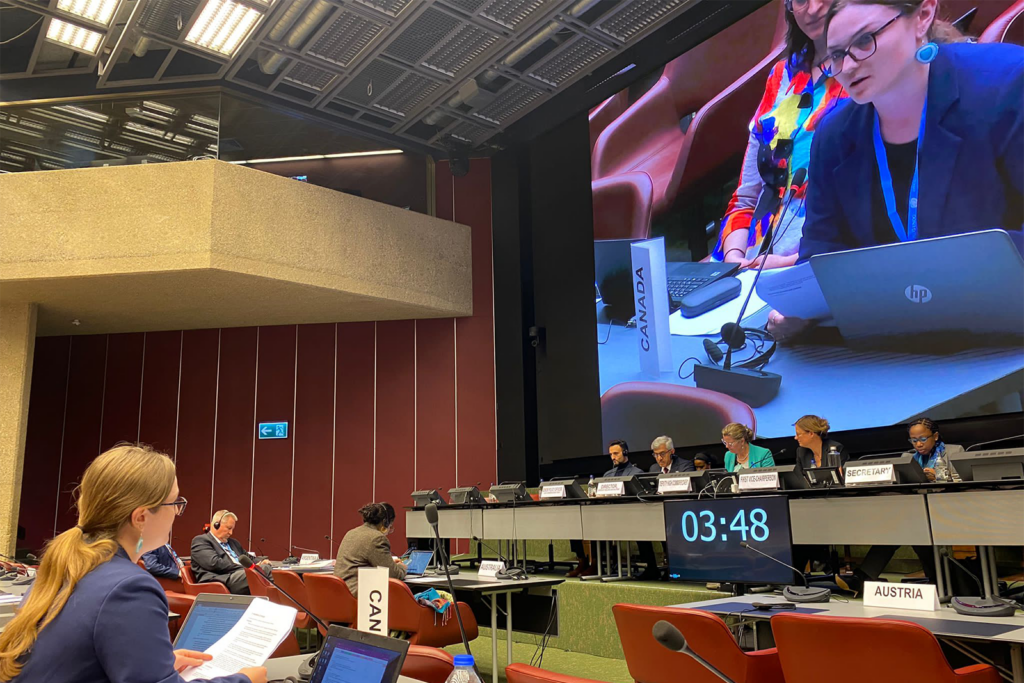Photo credit: Emily Miller
By: Emily Miller, MAGG
I am four months into my internship with the Permanent Mission of Canada to the UN in Geneva. I was really excited to come to Geneva to complete my internship in person. This was my first time moving abroad and my first time in Europe. In the month before I got here, I was trying to think of what I absolutely needed to bring with me. I have exchanged currencies before, but I remember my astonishment at how much Canadian dollars cost to get Euros. During my first month here, I was tracking the CDF-CAD exchange rate frequently in the hopes that the Canadian dollar would get stronger. Another challenge was that it did not occur to me that I needed an adaptor for the different plugs here. I only realized this when I got to my new apartment, fell asleep because I had not slept in 24 hours and woke up at 3AM with my phone nearly dead, realizing I would be unable to charge my phone.
My first month involved a big learning curve. I had worked as a policy analyst for the New Brunswick provincial government previously, so this was my reference point as I was learning what role the Mission played for the Canadian federal government in the multilateral space in Geneva. There is so much coordination and communication between the Mission and Ottawa and it took some time to understand these relationships and processes.
While there were some similarities in the functioning of the provincial and federal government, there were also differences. One big difference was the outcome of policy work. At the provincial level, policy work generally included research and analysis that would help to inform legislative amendments, for instance. At the Mission, direction is provided by Ottawa and the Mission works to advocate for Canadian priorities and interests abroad, but this looks different than legislative amendments. In Geneva, Canadian diplomats build relationships with UN agencies and Member States, actively participate in governing body meetings and briefings, and communicate closely with Ottawa about what is happening on the ground in different multilateral fora. I think my experience with the provincial government helped me to grasp the functioning and role of the Mission, but because the foreign policy process is quite different than provincial policy, especially from the viewpoint of the Mission, this took me longer to understand.
In December and January, I was primarily working with the health team. During my studies, health had not been my area of focus, so it also took some time to learn the global health acronyms, the role of the World Health Organization (WHO), and Canada’s global health priorities. I had the opportunity to attend the 37th WHO Programme Budget Administrative Committee and the 52nd WHO Executive Board (EB) which was an absolutely fascinating experience! It was so cool to witness the preparations, organization, and logistics that go into a governing body session from the perspective of a Member State. It is a lot of work, to say the least. I helped our Mission organize a side event during the WHO EB, where Ministers, Ambassadors, and Attaches were invited to the Mission to discuss the Future of Global Health Initiatives (FGHI). The event was very successful, as a rich discussion took place and it aimed to raise the profile of the FGHI among Member States. During the WHO EB, I also got the opportunity to deliver a national statement on behalf of Canada. This was a unique experience and I received a great deal of support from my colleagues who helped draft the statement and who were on the ground at the WHO.
The WHO EB marked the first leg of my internship. After this, I shifted my focus to humanitarian affairs. During my first month on the job, I developed a huge appreciation for the work done by everyon at the Mission from the Ambassador, to the diplomats, to the administrative assistants, the drivers, and security staff. Everyone’s hard work is critical for the success of Canada’s presence and participation to the UN in Geneva.
